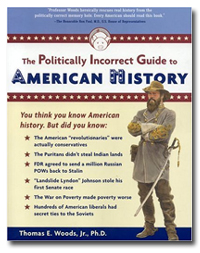A lot of people seem to believe that although the market economy is a swell system, it requires the equivalent of a Soviet commissar to be in charge of money and interest rates. This belief is altogether misplaced. The Federal Reserve System, or simply "the Fed," is both harmful and unnecessary.
Since the Fed was created in 1913 the dollar has lost at least 95 percent of its value. If the much-maligned gold standard had produced such a result we’d never hear the end of it, but in our system the Fed is, for whatever reason, curiously exempt from criticism. Under the Fed, therefore, people have lost an option they once had: accumulating savings in cash. Under a commodity standard, people could save for the future simply by accumulating precious-metal coins — which, back when they functioned as money, held or even increased their value. No one has that option any longer. In other words, only a fool would try to save by piling up dollar bills. Instead, everyone is forced to become a speculator, and to invest in securities markets they know little about and that can wipe them out entirely if times turn bad.
As early as the eighteenth century, Richard Cantillon identified distribution effects as another way inflation harmed the general public. The newly created money is injected at particular points. Whoever receives it first — that is, people who happen to be politically well connected — get to spend it before prices have commensurately risen, and these fortunate few thereby receive a windfall. By the time it trickles through to ordinary people, on the other hand, the general public has in the meantime been forced to pay the higher prices to which the new money gives rise.
Private and public debt have exploded under this system, especially since the collapse of Bretton Woods in 1971. No one has a right to be surprised when indebtedness skyrockets under a system in which credit can be created out of thin air.
The very existence of the central bank institutionalizes the problem of moral hazard. Moral hazard involves an actor’s willingness to behave with an artificially elevated level of risk tolerance because he believes any losses he incurs will be borne by someone else. Since there is no physical limitation on paper money creation, market actors know the paper money producer can bail them out if things go terribly wrong. They have been vindicated in this belief time and again. They will, therefore, be more reckless in their investment activity and speculation than they would in the absence of such a system.
We were once told that boom-bust business cycles were a thing of the past because, thanks to the Fed, we now had scientific management of the money supply. If anyone believes that today, I’d like to meet him. Artificially low interest rates courtesy of the Fed do not yield us a utopia of sunshine and kittens. To the contrary, they artificially stimulate capital-goods production and long-term investment. They thereby deform the structure of production into a configuration that the public’s freely expressed pattern of saving and consumption will be unable to sustain. When this phony boom inevitably collapses, it is "capitalism" that takes the blame — when in fact the Fed, a non-market institution, is the culprit.
I am interested in neither the saccharine promises nor the technical details of the alleged superiority of a monopoly fiat-money system. The Fed is the lifeblood of the empire, the great enabler of the perversion of the original American republic into the world’s largest and most powerful government. Even if the central bank did confer a net economic benefit, a contention the great Austrian economists F.A. Hayek and Ludwig von Mises strenuously denied (and indeed Hayek won the Nobel Prize in the process of denying), the alleged benefit could not possibly be worth the destruction of the American soul.
As it turns out, we don’t have to make that choice. When it comes to the Fed, justice, economic prosperity, and the values of the original American republic are joined together.
The Fed, its academic apologists, and the drones in our supposedly free press who demonize all dissent from the monetary status quo, have done our economy enough damage. For the sake of American freedom and prosperity, it is long past time that, in the spirit of Andrew Jackson, we killed the monster.
This is the opening statement I delivered in a debate last weekend at FreedomFest in Las Vegas on the topic "Fed Up with the Fed: Is It Time to Abolish?" Gene Epstein of Barron’s and I debated Warren Coats and John Fund. The debate will be televised on C-SPAN at some point in the future. I’ll post the date and time on the LRC blog and at my website as soon as it’s announced.





